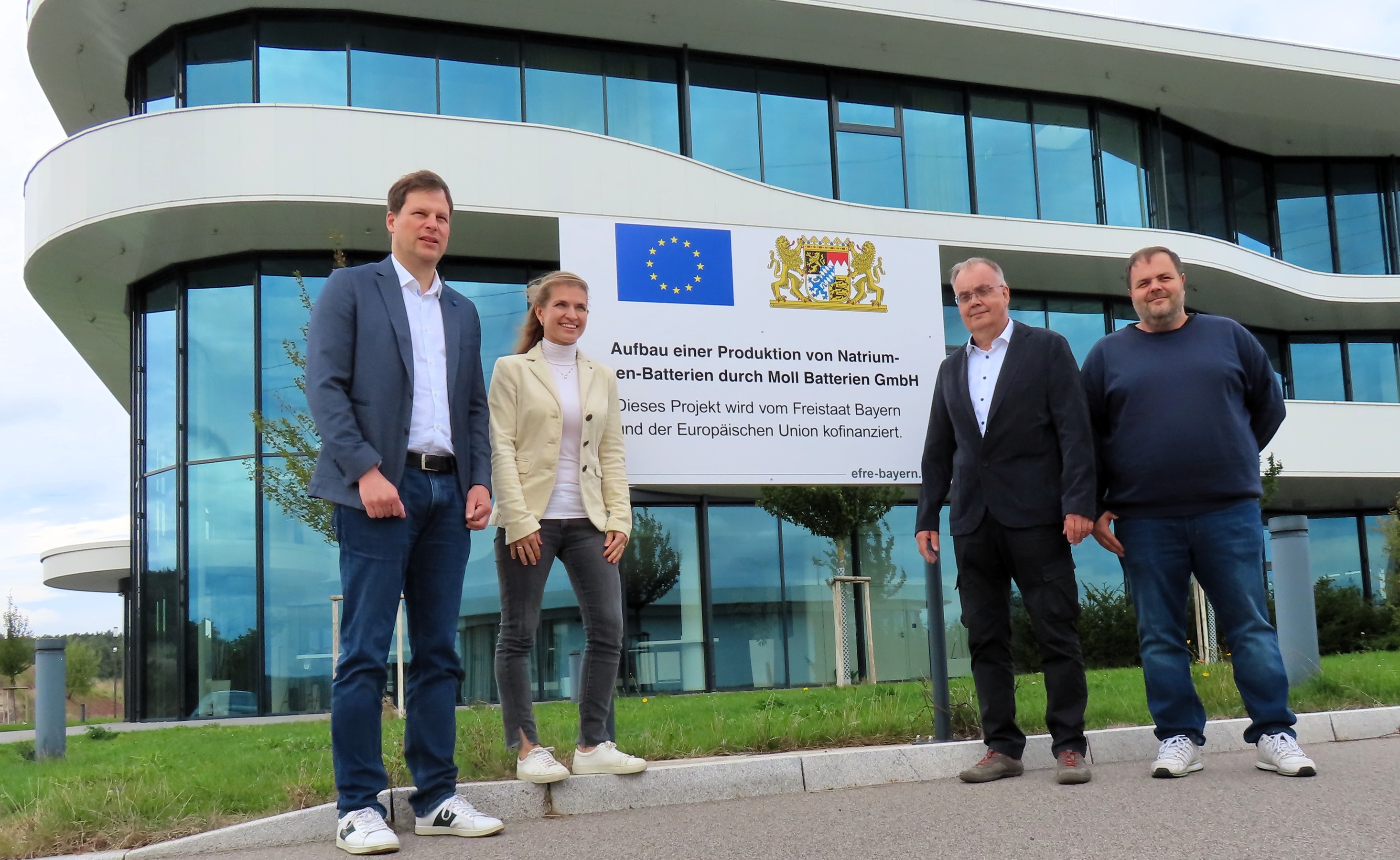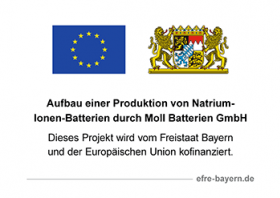
Exciting Project at Battery Manufacturer MOLL
- Überschrift Englisch: Exciting Project at Battery Manufacturer MOLL
- Untertitel Englisch: MOLL invests in new battery technology and creates 126 jobs in Lichtenfels/Schney
- Pressetext Inhalt Englisch:
Bad Staffelstein/Schney.
Interested visitors at battery manufacturer MOLL: Prof. Peter Urban (Authorized Representative of the Management Board) and his son, Managing Director Christian Urban, invited two local politicians for an information day and a short tour.MOLL Batterien GmbH is planning to establish a new, innovative battery production facility in the industrial area of Lichtenfels/Schney with an initial annual capacity of one gigawatt-hour (GWh). In addition to the 220 jobs at the company’s headquarters in Bad Staffelstein, 126 new jobs and apprenticeships will be created in Schney.
Prof. Urban emphasized that MOLL’s initiative represents an important first step and contribution to making the German battery industry competitive with Asian manufacturers. By the end of 2026, MOLL Batterien GmbH will be the first company in Europe to produce sodium-ion batteries (also known as NIB or post-lithium batteries) on an industrial scale.
At its Bad Staffelstein plant, MOLL currently produces up to 1.2 million starter batteries per year, mainly for motor vehicles. Major customers include the VW Group with its brands VW, Skoda, and Audi, as well as the aftermarket and export markets.
“MOLL has potential and a strong future — something that is often overlooked in medium-sized companies. The SME sector is the backbone of the German economy!” said Prof. Urban proudly, acknowledging the dedication of MOLL’s employees.
He explained that MOLL is meeting the challenges of industrial transformation head-on: maintaining proven strengths, leveraging diversification opportunities, and implementing innovations from in-house development.
As an example, Prof. Urban cited the technology transfer of MOLL’s globally recognized expertise in starter battery production. Cooperation with battery manufacturers in the Maghreb countries and Colombia has strengthened MOLL’s economic foundation.
The planned sodium-ion battery production in Schney offers MOLL a sustainable future perspective: not only is a new, innovative, and environmentally friendly battery technology being established, but new areas of application are also being opened up — such as energy storage systems for commerce and industry and power generation (primary and balancing energy).
Prof. Urban also sees potential for the automotive sector, where sodium-ion batteries could serve as starter and supply batteries in the medium term. MOLL plans to introduce its new battery types, currently in development, by mid-2026.
Looking ahead, MOLL is also advancing the development of sodium-ion batteries as traction batteries for electric vehicles. The first EVs using this type of battery were already presented in China in 2024.
The idea to locate the project at the state-of-the-art facility in Schney, built in 2021, arose during discussions between Prof. Urban, project partner and entrepreneur Günter Hofmann, and lawyer Jürgen Wittmann in November 2023.
District Administrator Christian Meißner and staff from the district office and the Government of Upper Franconia have supported MOLL’s plans from the very beginning — support for which Prof. Urban expressed deep gratitude.
The Schney site includes two separate buildings, offering 10,000 m² for NIB production and 5,500 m² for administration, management, and research & development.
During the tour, Christina Deuerling (CSU mayoral candidate for the city of Lichtenfels) and Holger Then (CSU mayoral candidate for Bad Staffelstein) had the opportunity to see the site and ask questions.
“Our main plant will remain in Bad Staffelstein, while our second facility is being built in Lichtenfels. Today, both candidates can already get a glimpse of what we’re creating here,” said Prof. Urban.
In the field of research and development, MOLL maintains close cooperation with Coburg University of Applied Sciences and the Bavarian Center for Battery Technology (BayBatt).
“If we implement the Schney project together with full commitment, Upper Franconia will become home to the first industrial sodium-ion battery production outside of China,” said Prof. Urban.
With the ongoing expansion of renewable energies and falling electricity storage costs, battery storage systems are becoming an increasingly central component of the energy transition, he added confidently.
There’s also another reason to celebrate soon: MOLL will turn 80 next year. The company was founded in 1946 by Peter J. Moll, inventor of numerous innovations and holder of many patents.
The construction of the sodium-ion battery production in Schney is scheduled to begin at the end of October 2025, with commissioning planned for September 2026. The investment volume amounts to approximately €103 million, supported by funding from the Free State of Bavaria and the European Union.
An open day is planned for both Bad Staffelstein and Schney in 2026. By then, MOLL also expects to have chosen a name for its planned independent battery research center, developed in cooperation with esteemed partners from science, industry, and politics.
Info:
The sodium-ion battery (NIB or post-lithium battery, English: Sodium-Ion Battery / SIB) stores electrical energy using ions of the alkali metal sodium (commonly known as table salt). NIBs do not require critical raw materials such as lithium, cobalt, or copper and are well-suited for large-scale energy storage in power grids. They also pose a lower fire and explosion risk than lithium batteries.Advantages include: environmental and resource conservation, inexpensive and readily available raw materials, extremely low self-discharge, and fast-charging capability.
- Quellenangabe & Autor Englisch: Monika Schütz

- Hits: 3170

